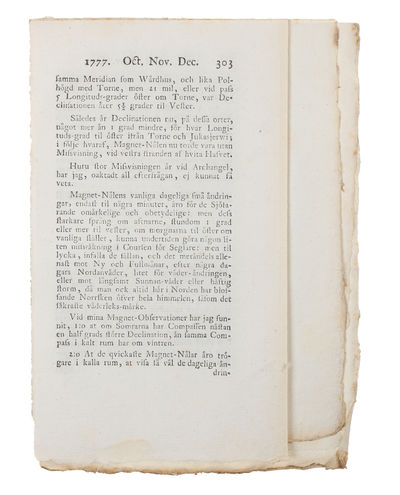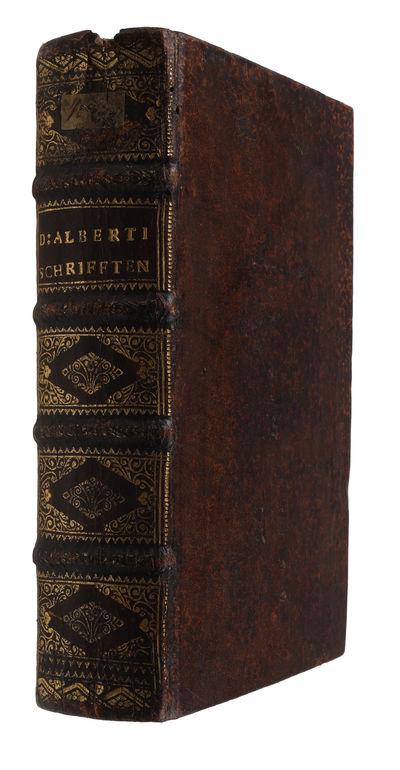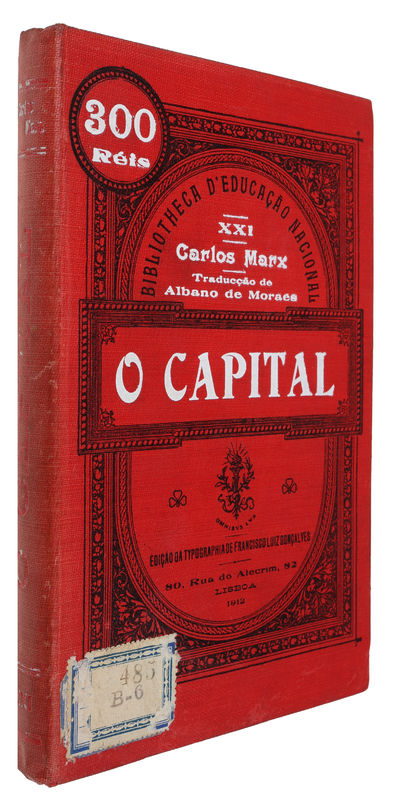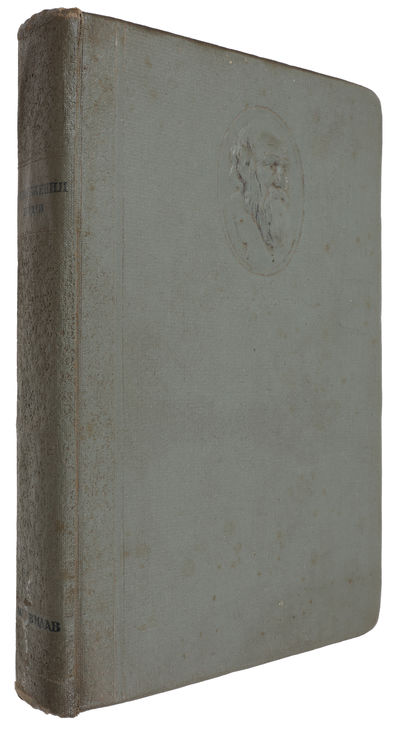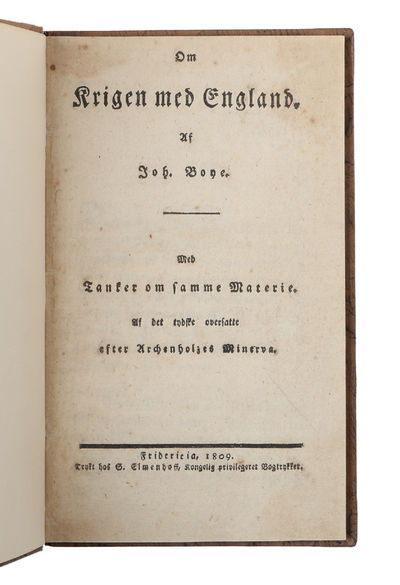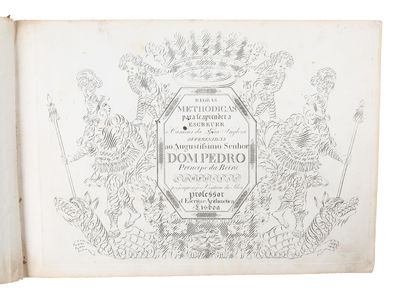MARX, KARL.
Kapital. Kritika politicheskoj ekonomii. Perevod c nmetskago. Tom pervoej. Kniga I. Protschess proizvodstva Kapitala. (Russian, = The Capital. Critique of the Political Economy. Translated from German. Volume One. Book I [all].). - [FIRST TRANSLATION INTO ANY LANGUAGE OF "THE BIBLE OF MARXISM"]
Herman H. J. Lynge & Søn A/S
lyn60281
S.-Peterburg, N.I. Poliakov, 1872. Large 8vo. In a nice recent half calf binding with gilt lettering to spine and five raised bands. First few leaves with light soling and a closed tear and a few marginal repairs to title-page. pp. 11-18 with repairs to upper outer corner. Closed tears to last leaf, otherwise a fine copy. XIII, (3), 678 pp. (wanting the half-title).
First Russian edition (first issue, with the issue-pointers), being the first translation into any language, of Marx' immensely influential main work, probably the greatest revolutionary work of the nineteenth century.Marx' groundbreaking "Das Kapital" originally appeared in German in 1867, and only the first part of the work appeared in Marx' lifetime. The very first foreign translation of the work was that into Russian, which, considering Russian censorship at the time, would seem a very unlikely event. But as it happened, "Das Kapital" actually came to enjoy greater renown in Russia than in any other country; for many varying reasons, it won a warm reception in many political quarters in Russia, and it enjoyed a totally unexpected rapid and widespread success. The first Russian translation of "Das Kapital" came to have a profound influence the economic development of of Russia. It was frequently quoted in the most important economic and political discussions on how to industrialize Russia and the essential points of the work were seen by many as the essential questions for an industrializing Russia. " "Das Kapital" arrived in Russia just at the moment that the Russian economy was recovering from the slump that followed Emancipation and was beginning to assume capitalist characteristics. Industrialization raised in the minds of the intelligentsia the question of their country's economic destiny. And it was precisely this concern that drew Mikhailovsky and many of the "intelligenty" to "Das Kapital"." (Resis, p. 232).The story of how the first printing of the first translation of "Das Kapital" came about, is quite unexpected. As the "triumph of Marxism in backward Russia is commonly regarded as a historical anomaly" (Resis, p. 221), so is the triumph of the first Russian edition of "Das Kapital". The main credit for the coming to be of the translation of "Das Kapital" must be given to Nicolai Danielson, later a highly important economist in his own right. The idea came from a circle of revolutionary youths in St. Petersburg, including N.F. Danielson, G.A. Lopatin, M.F. Negreskul, and N.N. Liubavin, all four of whom participated in the project. Danielson had read the work shortly after its publication and it had made such an impact on him that he decided to make it available to the Russian reading public. He persuaded N.I. Poliakov to run the risk of publishing it. "Poliakov, the publisher, specialized in publishing authors, Russian and foreign, considered dangerous by the authorities. Poliakov also frequently subsidized revolutionaries by commissioning them to do translations for his publishing house. Diffusion of advanced ideas rather than profit was no doubt his primary motive in publishing the book." (Resis, p. 222). Owing to Danielson's initiative, Poliakov engaged first Bakunin, and then Lopatin to do the translation. Danielson himself finished the translation and saw the work through press. It was undeniably his leadership that brought Marx to the Russian reading public. In fact, with the first Russian edition of "Das Kapital", Danielson was responsible for the first public success of the revolutionizing work. "Few scholars today would deny that "Das Kapital" has had an enormous effect on history in the past hundred years. Nonetheless, when the book was published in Hamburg on September 5, 1867, it made scarcely a stir, except among German revolutionaries. Marx complained that his work was greeted by "a conspiracy of silence" on the part of "a pack of liberals and vulgar economists." However desperately he contrived to provoke established economists to take up "Das Kapital"'s challenge to their work, his efforts came to nought. But in October 1868 Marx received good news from an unexpected source. From Nikolai Frantsevich Danielson, a young economist employed by the St. Petersburg Mutual Credit Society, came a letter informing Marx that N. P. Poliakov, a publisher of that city, desired to publish a Russian translation of the first volume of "Das Kapital"; moreover, he also wanted to publish the forthcoming second volume. Danielson, the publisher's representative, requested that Marx send him the proofs of volume 2 as they came off the press so that Poliakov could publish both volumes simultaneously. Marx replied immediately. The publication of a Russian edition of volume 1, he wrote, should not be held up, because the completion of volume 2 might be delayed by some six months [in fact, it did not appear in Marx' life-time and was only published ab. 17 years later, in 1885]; and in any case volume 1 represented an independent whole. Danielson proceeded at once to set the project in motion. Nearly four years passed, however, before a Russian translation appeared. Indeed, a year passed before the translation was even begun, and four translators tried their hand at it before Danielson was able to send the manuscript to the printers in late December 1871." (Resis, pp. 221-22). This explains how the book came to be translated, but how did this main work of revolutionary thought escape the rigid Russian censors? "By an odd quirk of history the first foreign translation of "Das Kapital" to appear was the Russian, which Petersburgers found in their bookshops early in April 1872. Giving his imprimatur, the censor, one Skuratov, had written "few people in Russia will read it, and still fewer will understand it." He was wrong: the edition of three thousand sold out quickly; and in 1880 Marx was writing to his friend F.A. Sorge that "our success is still greater in Russia, where "Kapital" is read and appreciated more than anywhere else." (PMM 359, p.218). Astonishingly, Within six weeks of the publication date, nine hundred copies of the edition of three thousand had already been sold."Under the new laws on the press, "Das Kapital" could have been proscribed on any number of grounds. The Temporary Rules held, for example, that censorship must not permit publication of works that "expound the harmful doctrines of socialism or communism" or works that "rouse enmity and hatred of one class for another." The Board of Censors of Foreign Publications was specifically instructed to prohibit importation of works contrary to the tenets of the Orthodox Church or works that led to atheism, materialism, or disrespect for Scriptures. Nor did the recent fate of the works of Marx and Engels at the hands of the censors offer much hope that "Das Kapital" would pass censorship. As recently as August 11, the censors of foreign works had decided to ban importation of Engels' "Die Lage der arbeitenden Klassen in England", and, according to Lopatin, the censors reprimanded Poliakov for daring to run announcements on book jackets of the forthcoming publication of "Das Kapital". By 1872 the censors had prohibited the importation and circulation of all works by Marx and Engels except one - "Das Kapital". The book, as we shall see, had already won some recognition in Russia shortly after its publication in Germany. Not until 1871, however, did the censors render a judgment on the book, when the Central Committee of Censors of Foreign Publications, on the recommendation of its reader, permitted importation and circulation of the book both in the original language and in translation. The official reader had described the book as "a difficult, inaccessible, strictly scientific work," implying that it could scarcely pose a danger to the state. [...] The length and complexity of the book prompted the office to divide the task of scrutinizing it between two readers, D. Skuratov, who read the first half of the book, and A. De-Roberti, who read the last half. Skuratov dutifully listed objectionable socialist and antireligious passages, taking special note of Marx's harsh attack on the land reforms General Kiselev had instituted in the Danubian Principalities. But in his report Skuratov dismissed these attacks as harmless, since they were imbedded in a "colossal mass of abstruse, somewhat obscure politico-economic argumentation." Indeed, he regarded the work as its own best antidote to sedition. "It can be confidently stated," he wrote, "that in Russia few will read it and even fewer will understand it." Second, he said, the book could do little harm. Since the book attacked a system rather than individual persons, Skuratov implied that the book would not incite acts threatening the safety of the royal family and government officials. Third, he believed that the argument of the book did not apply to Russia. Marx attacked the unbridled competition practiced in the British factory system, and such attacks, Skuratov asserted, could find no target in Russia because the tsarist regime did not pursue a policy of laissez faire. Indeed, at that very moment, Skuratov stated, a special commission had drafted a plan that "as zealously protects the workers' well-being from abuses on the part of the employers as it protects the employers' interests against lack of discipline and nonfulfillment of obligations on the part of the workers." Repeating most of Skuratov's views, De-Roberti also noted that the book contained a good account of the impact of the factory system and the system of unpaid labor time that prevailed in the West. In spite of the obvious socialist tendency of the book, he concluded, a court case could scarcely be made against it, because the censors of foreign works had already agreed to permit importation and circulation of the German edition. With the last barrier removed, on March 27, 1872, the Russian translation of "Das Kapital" went on sale in the Russian Empire. The publisher, translators, and advocates of the book had persevered in the project for nearly four years until they were finally able to bring the book to the Russian reading public." (Resis, pp. 220-22). The Russian authorities quickly realized, however, that Skuratov's statement could not have been more wrong, and the planned second edition of the Russian translation was forbidden; thus it came to be published in New York, in 1890. That second edition is nearly identical to the first, which can be distinguished by the misplaced comma opposite "p. 73" in the table of contents (replaced by a full stop in the 2nd ed.) and the "e" at the end of l. 40 on p. 65 (replaced by a "c" in the 2nd ed.). A third edition, translated from the fourth German edition, appeared in 1898. Volumes 2 and 3 of "Das Kapital" appeared in Russian translation, also by Danielson, in 1885 and 1896.See: Albert Resis, Das Kapital Comes to Russia, in: Slavic Review, Vol. 29, No. 2 (Jun., 1970), pp. 219-237.
First Russian edition (first issue, with the issue-pointers), being the first translation into any language, of Marx' immensely influential main work, probably the greatest revolutionary work of the nineteenth century.Marx' groundbreaking "Das Kapital" originally appeared in German in 1867, and only the first part of the work appeared in Marx' lifetime. The very first foreign translation of the work was that into Russian, which, considering Russian censorship at the time, would seem a very unlikely event. But as it happened, "Das Kapital" actually came to enjoy greater renown in Russia than in any other country; for many varying reasons, it won a warm reception in many political quarters in Russia, and it enjoyed a totally unexpected rapid and widespread success. The first Russian translation of "Das Kapital" came to have a profound influence the economic development of of Russia. It was frequently quoted in the most important economic and political discussions on how to industrialize Russia and the essential points of the work were seen by many as the essential questions for an industrializing Russia. " "Das Kapital" arrived in Russia just at the moment that the Russian economy was recovering from the slump that followed Emancipation and was beginning to assume capitalist characteristics. Industrialization raised in the minds of the intelligentsia the question of their country's economic destiny. And it was precisely this concern that drew Mikhailovsky and many of the "intelligenty" to "Das Kapital"." (Resis, p. 232).The story of how the first printing of the first translation of "Das Kapital" came about, is quite unexpected. As the "triumph of Marxism in backward Russia is commonly regarded as a historical anomaly" (Resis, p. 221), so is the triumph of the first Russian edition of "Das Kapital". The main credit for the coming to be of the translation of "Das Kapital" must be given to Nicolai Danielson, later a highly important economist in his own right. The idea came from a circle of revolutionary youths in St. Petersburg, including N.F. Danielson, G.A. Lopatin, M.F. Negreskul, and N.N. Liubavin, all four of whom participated in the project. Danielson had read the work shortly after its publication and it had made such an impact on him that he decided to make it available to the Russian reading public. He persuaded N.I. Poliakov to run the risk of publishing it. "Poliakov, the publisher, specialized in publishing authors, Russian and foreign, considered dangerous by the authorities. Poliakov also frequently subsidized revolutionaries by commissioning them to do translations for his publishing house. Diffusion of advanced ideas rather than profit was no doubt his primary motive in publishing the book." (Resis, p. 222). Owing to Danielson's initiative, Poliakov engaged first Bakunin, and then Lopatin to do the translation. Danielson himself finished the translation and saw the work through press. It was undeniably his leadership that brought Marx to the Russian reading public. In fact, with the first Russian edition of "Das Kapital", Danielson was responsible for the first public success of the revolutionizing work. "Few scholars today would deny that "Das Kapital" has had an enormous effect on history in the past hundred years. Nonetheless, when the book was published in Hamburg on September 5, 1867, it made scarcely a stir, except among German revolutionaries. Marx complained that his work was greeted by "a conspiracy of silence" on the part of "a pack of liberals and vulgar economists." However desperately he contrived to provoke established economists to take up "Das Kapital"'s challenge to their work, his efforts came to nought. But in October 1868 Marx received good news from an unexpected source. From Nikolai Frantsevich Danielson, a young economist employed by the St. Petersburg Mutual Credit Society, came a letter informing Marx that N. P. Poliakov, a publisher of that city, desired to publish a Russian translation of the first volume of "Das Kapital"; moreover, he also wanted to publish the forthcoming second volume. Danielson, the publisher's representative, requested that Marx send him the proofs of volume 2 as they came off the press so that Poliakov could publish both volumes simultaneously. Marx replied immediately. The publication of a Russian edition of volume 1, he wrote, should not be held up, because the completion of volume 2 might be delayed by some six months [in fact, it did not appear in Marx' life-time and was only published ab. 17 years later, in 1885]; and in any case volume 1 represented an independent whole. Danielson proceeded at once to set the project in motion. Nearly four years passed, however, before a Russian translation appeared. Indeed, a year passed before the translation was even begun, and four translators tried their hand at it before Danielson was able to send the manuscript to the printers in late December 1871." (Resis, pp. 221-22). This explains how the book came to be translated, but how did this main work of revolutionary thought escape the rigid Russian censors? "By an odd quirk of history the first foreign translation of "Das Kapital" to appear was the Russian, which Petersburgers found in their bookshops early in April 1872. Giving his imprimatur, the censor, one Skuratov, had written "few people in Russia will read it, and still fewer will understand it." He was wrong: the edition of three thousand sold out quickly; and in 1880 Marx was writing to his friend F.A. Sorge that "our success is still greater in Russia, where "Kapital" is read and appreciated more than anywhere else." (PMM 359, p.218). Astonishingly, Within six weeks of the publication date, nine hundred copies of the edition of three thousand had already been sold."Under the new laws on the press, "Das Kapital" could have been proscribed on any number of grounds. The Temporary Rules held, for example, that censorship must not permit publication of works that "expound the harmful doctrines of socialism or communism" or works that "rouse enmity and hatred of one class for another." The Board of Censors of Foreign Publications was specifically instructed to prohibit importation of works contrary to the tenets of the Orthodox Church or works that led to atheism, materialism, or disrespect for Scriptures. Nor did the recent fate of the works of Marx and Engels at the hands of the censors offer much hope that "Das Kapital" would pass censorship. As recently as August 11, the censors of foreign works had decided to ban importation of Engels' "Die Lage der arbeitenden Klassen in England", and, according to Lopatin, the censors reprimanded Poliakov for daring to run announcements on book jackets of the forthcoming publication of "Das Kapital". By 1872 the censors had prohibited the importation and circulation of all works by Marx and Engels except one - "Das Kapital". The book, as we shall see, had already won some recognition in Russia shortly after its publication in Germany. Not until 1871, however, did the censors render a judgment on the book, when the Central Committee of Censors of Foreign Publications, on the recommendation of its reader, permitted importation and circulation of the book both in the original language and in translation. The official reader had described the book as "a difficult, inaccessible, strictly scientific work," implying that it could scarcely pose a danger to the state. [...] The length and complexity of the book prompted the office to divide the task of scrutinizing it between two readers, D. Skuratov, who read the first half of the book, and A. De-Roberti, who read the last half. Skuratov dutifully listed objectionable socialist and antireligious passages, taking special note of Marx's harsh attack on the land reforms General Kiselev had instituted in the Danubian Principalities. But in his report Skuratov dismissed these attacks as harmless, since they were imbedded in a "colossal mass of abstruse, somewhat obscure politico-economic argumentation." Indeed, he regarded the work as its own best antidote to sedition. "It can be confidently stated," he wrote, "that in Russia few will read it and even fewer will understand it." Second, he said, the book could do little harm. Since the book attacked a system rather than individual persons, Skuratov implied that the book would not incite acts threatening the safety of the royal family and government officials. Third, he believed that the argument of the book did not apply to Russia. Marx attacked the unbridled competition practiced in the British factory system, and such attacks, Skuratov asserted, could find no target in Russia because the tsarist regime did not pursue a policy of laissez faire. Indeed, at that very moment, Skuratov stated, a special commission had drafted a plan that "as zealously protects the workers' well-being from abuses on the part of the employers as it protects the employers' interests against lack of discipline and nonfulfillment of obligations on the part of the workers." Repeating most of Skuratov's views, De-Roberti also noted that the book contained a good account of the impact of the factory system and the system of unpaid labor time that prevailed in the West. In spite of the obvious socialist tendency of the book, he concluded, a court case could scarcely be made against it, because the censors of foreign works had already agreed to permit importation and circulation of the German edition. With the last barrier removed, on March 27, 1872, the Russian translation of "Das Kapital" went on sale in the Russian Empire. The publisher, translators, and advocates of the book had persevered in the project for nearly four years until they were finally able to bring the book to the Russian reading public." (Resis, pp. 220-22). The Russian authorities quickly realized, however, that Skuratov's statement could not have been more wrong, and the planned second edition of the Russian translation was forbidden; thus it came to be published in New York, in 1890. That second edition is nearly identical to the first, which can be distinguished by the misplaced comma opposite "p. 73" in the table of contents (replaced by a full stop in the 2nd ed.) and the "e" at the end of l. 40 on p. 65 (replaced by a "c" in the 2nd ed.). A third edition, translated from the fourth German edition, appeared in 1898. Volumes 2 and 3 of "Das Kapital" appeared in Russian translation, also by Danielson, in 1885 and 1896.See: Albert Resis, Das Kapital Comes to Russia, in: Slavic Review, Vol. 29, No. 2 (Jun., 1970), pp. 219-237.
Adress:
Silkegade 11
DK-1113 Copenhagen Denmark
Telefon:
CVR/VAT:
DK 16 89 50 16
E-post:
Webb:
![Kapital. Kritika politicheskoj ekonomii. Perevod c nmetskago. Tom pervoej. Kniga I. Protschess proizvodstva Kapitala. (Russian, = The Capital. Critique of the Political Economy. Translated from German. Volume One. Book I [all].). - [FIRST TRANSLATION INTO ANY LANGUAGE OF "THE BIBLE OF MARXISM"] (photo 1)](https://d3525k1ryd2155.cloudfront.net/h/709/991/1527991709.0.l.0.jpg)
![Kapital. Kritika politicheskoj ekonomii. Perevod c nmetskago. Tom pervoej. Kniga I. Protschess proizvodstva Kapitala. (Russian, = The Capital. Critique of the Political Economy. Translated from German. Volume One. Book I [all].). - [FIRST TRANSLATION INTO ANY LANGUAGE OF "THE BIBLE OF MARXISM"] (photo 2)](https://d3525k1ryd2155.cloudfront.net/h/709/991/1527991709.1.l.0.jpg)
![Kapital. Kritika politicheskoj ekonomii. Perevod c nmetskago. Tom pervoej. Kniga I. Protschess proizvodstva Kapitala. (Russian, = The Capital. Critique of the Political Economy. Translated from German. Volume One. Book I [all].). - [FIRST TRANSLATION INTO ANY LANGUAGE OF "THE BIBLE OF MARXISM"] (photo 3)](https://d3525k1ryd2155.cloudfront.net/h/709/991/1527991709.2.l.0.jpg)
![Kapital. Kritika politicheskoj ekonomii. Perevod c nmetskago. Tom pervoej. Kniga I. Protschess proizvodstva Kapitala. (Russian, = The Capital. Critique of the Political Economy. Translated from German. Volume One. Book I [all].). - [FIRST TRANSLATION INTO ANY LANGUAGE OF "THE BIBLE OF MARXISM"] (photo 4)](https://d3525k1ryd2155.cloudfront.net/h/709/991/1527991709.3.l.0.jpg)
![Kapital. Kritika politicheskoj ekonomii. Perevod c nmetskago. Tom pervoej. Kniga I. Protschess proizvodstva Kapitala. (Russian, = The Capital. Critique of the Political Economy. Translated from German. Volume One. Book I [all].). - [FIRST TRANSLATION INTO ANY LANGUAGE OF "THE BIBLE OF MARXISM"] (photo 5)](https://d3525k1ryd2155.cloudfront.net/h/709/991/1527991709.4.l.0.jpg)
![Kapital. Kritika politicheskoj ekonomii. Perevod c nmetskago. Tom pervoej. Kniga I. Protschess proizvodstva Kapitala. (Russian, = The Capital. Critique of the Political Economy. Translated from German. Volume One. Book I [all].). - [FIRST TRANSLATION INTO ANY LANGUAGE OF "THE BIBLE OF MARXISM"] (photo 6)](https://d3525k1ryd2155.cloudfront.net/h/709/991/1527991709.5.l.0.jpg)
![Kapital. Kritika politicheskoj ekonomii. Perevod c nmetskago. Tom pervoej. Kniga I. Protschess proizvodstva Kapitala. (Russian, = The Capital. Critique of the Political Economy. Translated from German. Volume One. Book I [all].). - [FIRST TRANSLATION INTO ANY LANGUAGE OF "THE BIBLE OF MARXISM"] (photo 7)](https://d3525k1ryd2155.cloudfront.net/h/709/991/1527991709.6.l.0.jpg)
![Kapital. Kritika politicheskoj ekonomii. Perevod c nmetskago. Tom pervoej. Kniga I. Protschess proizvodstva Kapitala. (Russian, = The Capital. Critique of the Political Economy. Translated from German. Volume One. Book I [all].). - [FIRST TRANSLATION INTO ANY LANGUAGE OF "THE BIBLE OF MARXISM"] (photo 8)](https://d3525k1ryd2155.cloudfront.net/h/709/991/1527991709.7.l.0.jpg)
![Kapital. Kritika politicheskoj ekonomii. Perevod c nmetskago. Tom pervoej. Kniga I. Protschess proizvodstva Kapitala. (Russian, = The Capital. Critique of the Political Economy. Translated from German. Volume One. Book I [all].). - [FIRST TRANSLATION INTO ANY LANGUAGE OF "THE BIBLE OF MARXISM"] (photo 9)](https://d3525k1ryd2155.cloudfront.net/h/709/991/1527991709.8.l.0.jpg)
![Kapital. Kritika politicheskoj ekonomii. Perevod c nmetskago. Tom pervoej. Kniga I. Protschess proizvodstva Kapitala. (Russian, = The Capital. Critique of the Political Economy. Translated from German. Volume One. Book I [all].). - [FIRST TRANSLATION INTO ANY LANGUAGE OF "THE BIBLE OF MARXISM"] (photo 10)](https://d3525k1ryd2155.cloudfront.net/h/709/991/1527991709.9.l.0.jpg)
